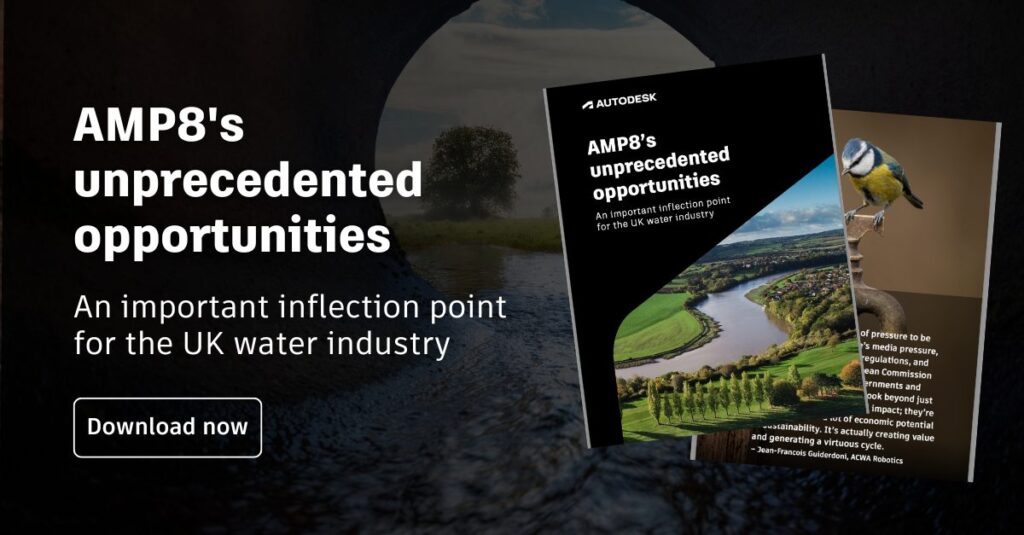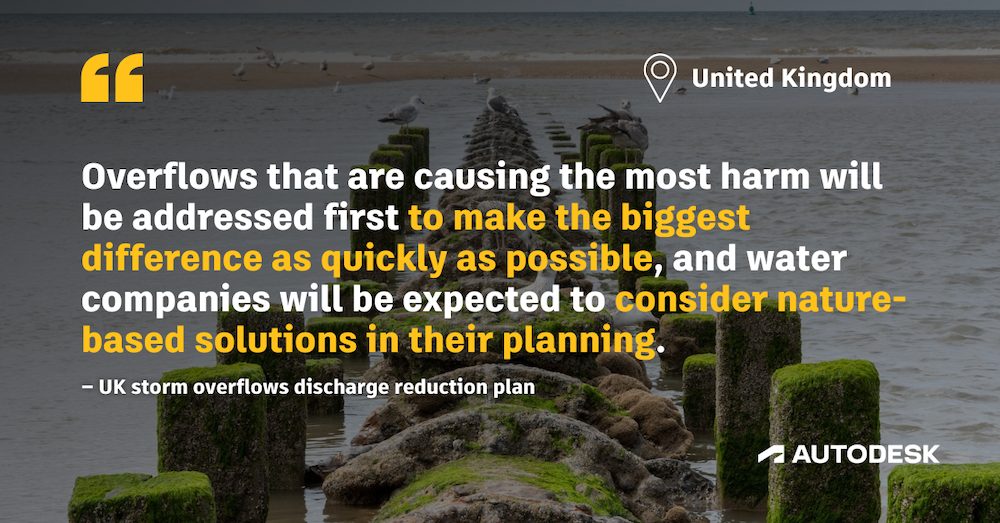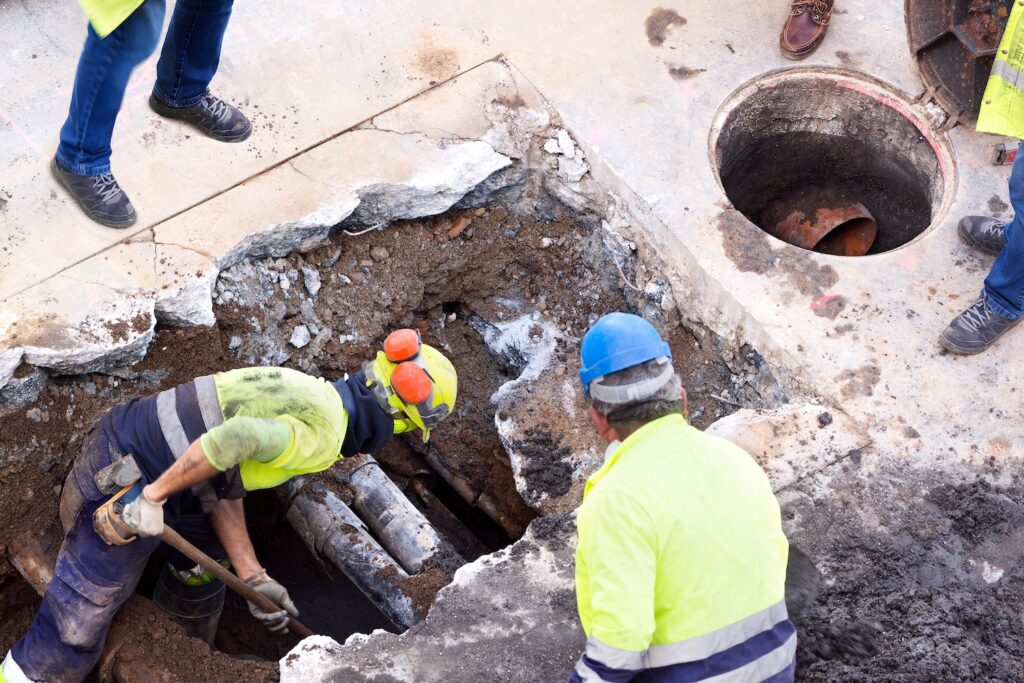If you live in the UK, you know all about the water industry’s sewage and finance woes. The past few years has seen a steady stream of bad news and increasingly vocal public outcry. But there is reason to believe that things may be finally turning around. Ofwat, the government regulator in charge of funding, is ready to inject tens of billions of pounds into more future-forward ways of working. After following this story very closely and writing about it for the past two years, we decided to compile a three-part white paper that digs into what Ofwat wants to see and how technology can help deliver it. We’re publishing the introduction here on the One Water Blog, but you can download the report any time. If you don’t know anything about the importance of this issue, this introduction is a good summary of how the UK got here.

Foreward: What Ofwat wants in a nutshell
Beginning April 1, 2025, and running for five years, AMP8 replaces the
existing £51 billion AMP7 investments in the water sector with a new set of challenges and targets. A record £96B was requested by water utilities for infrastructure and monitoring during AMP8 – the largest ever budget for an asset management plan. This is 88% more money requested than during the last period. Ofwat has reduced the amount to be granted to £88B, tightening the belt for water companies and negotiating spending down slightly, but it is still a significant amount of money for the beleaguered water sector.
In short, AMP8 represents a unique opportunity for water professionals in the UK, who may be able to secure funding for three key priorities:
- Digitalisation: Adopt full digitalisation and data-centric ways of working
- CSOs: Switch from reacting to CSO spills to proactively preventing them before they happen
- Nature-based solutions: Incorporate Biodiversity Net Gain (BNG) and Sustainable Drainage Systems (SuDS) into regular ways of working

To say that much has changed since AMP7 would be an understatement
There has been a growing outcry for the UK government to open its purse and help solve the water industry’s many challenges. With AMP8, that is about to happen. The AMP8 funding cycle is a prime opportunity for water professionals to improve their infrastructure, processes, and approach to solving problems.
This report will highlight the opportunity and provide you with a winning strategy that employs digital twin hydraulic modeling and nature-based drainage techniques to flip your approach from being reactive to actively designing, predicting, and employing solutions to stop CSO spills before they happen and build in more environmentally friendly ways.

The way forward, as outlined by Ofwat and the Environment Agency, requires water professionals to focus on digitalisation and data, and it strongly encourages them to put nature-based solutions like SuDS at the top of their hierarchy of solutions.
In short, regulators want to see change, and they are ready to allocate record levels of AMP funding to help water professionals take deliberate steps to improve their operations.
How we got here
In early 2020, at the beginning of the global pandemic, the water industry in the UK had been in deep discussion about reaching Net Zero Carbon Emission goals by 2030. There was much optimism at the time for reaching the goal early, which would, if seen through, beat the UK’s broader target of Net Zero emissions by 2050 by twenty years. But so much has happened since then which has shifted the priorities of both Ofwat and water utilities.
The connection to nature that bloomed during the pandemic may have been one of the only welcome side effects of COVID-19, which required everyone to slow down and take a perhaps-much-needed break. A change in our habits reminded everyone how interconnected and vulnerable humans can be. As our consumption patterns subsided or changed, we were able to see just how unsustainable some aspects of our society were – and that includes how we use water.

During lockdown, we rediscovered our local environments. The story in the UK was one of discovery, as some people swam in their local streams and rivers for the first time. This led many to take an increased interest in water quality which led to more public awareness of where local wastewater treatment plants were located and how they were performing, particularly after heavy rainfalls. Visible pollution from CSOs led to the rise of the citizen science movement, with individuals using their right to request information from water companies about effluent discharges, and then posting the results on the Internet.
All of these factors have encouraged regulators to dramatically step-up enforcement. Even before the pandemic began, Ofwat, the economic regulator of the water industry, imposed a record-breaking £126M fine on Southern Water for breaches of discharge permits and causing environmental harm. The regulator has gone on to investigate the entire industry and is progressing with enforcement against potentially five more companies.
The penalties are serious. The Environment Agency has even suggested that they could impose prison sentences for CEOs.
These trends seem to have reached a tipping point, with the financial viability of both Thames Water and the water industry at large coming into question, with a reputed £60+ billion of debt amassed across the sector. The increased debt load of water companies has not helped water professionals respond to these challenges.
Should some of these companies, who may be facing existential threats, be bailed out or re-nationalised? How can politicians and regulators ensure that desperately needed future water infrastructure funding will be put to good use? These issues are far from solved, but the important work of water professionals must continue, regardless of the outcome.

One thing is for certain, these high-profile developments have surely influenced the choices that Ofwat plans to make for AMP8, and by extension the choices you may need to make to meet regulatory challenges and move forward with confidence. While this may feel like a real time of crisis for the water industry, it is also the best opportunity UK water professionals have to secure much-needed funding and improve the industry’s ways of working to meet and exceed the challenges of the future.
Want to learn more? Read the full report.
